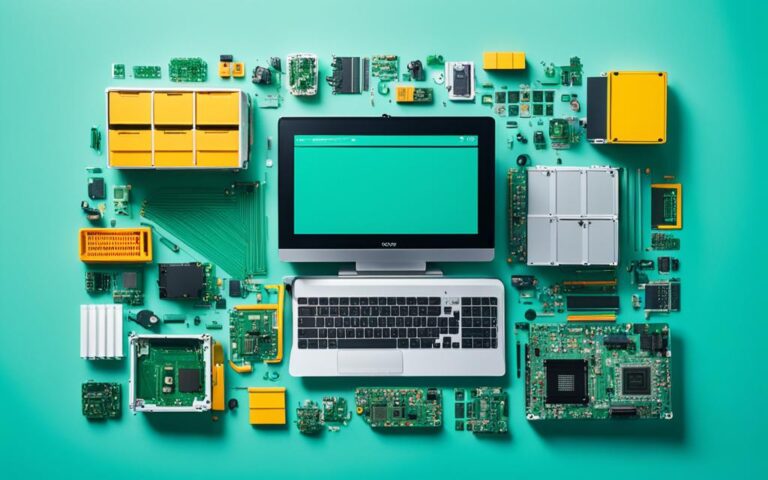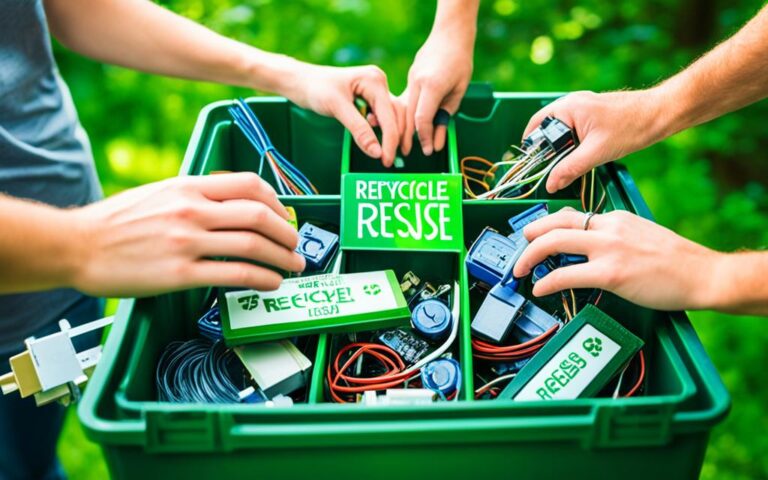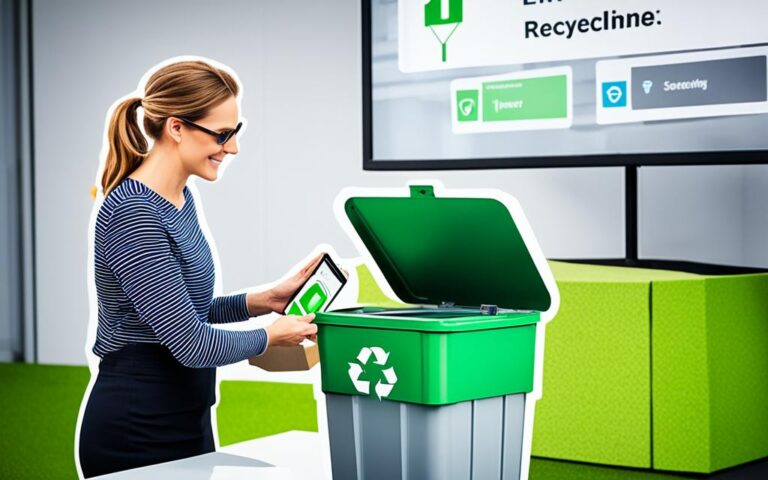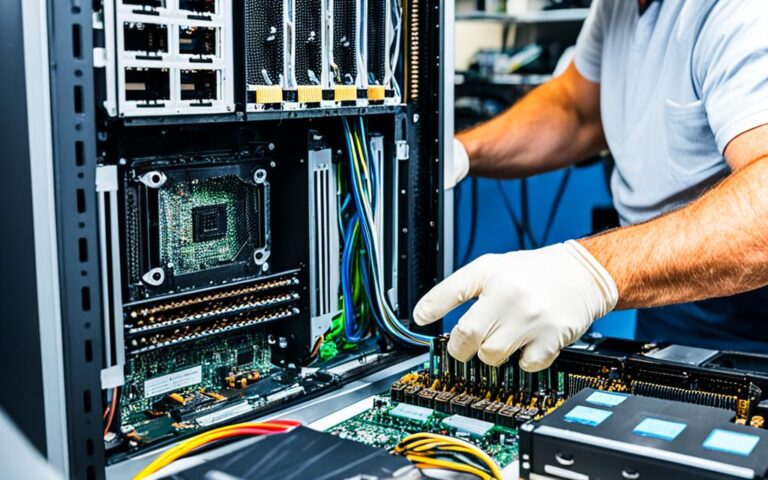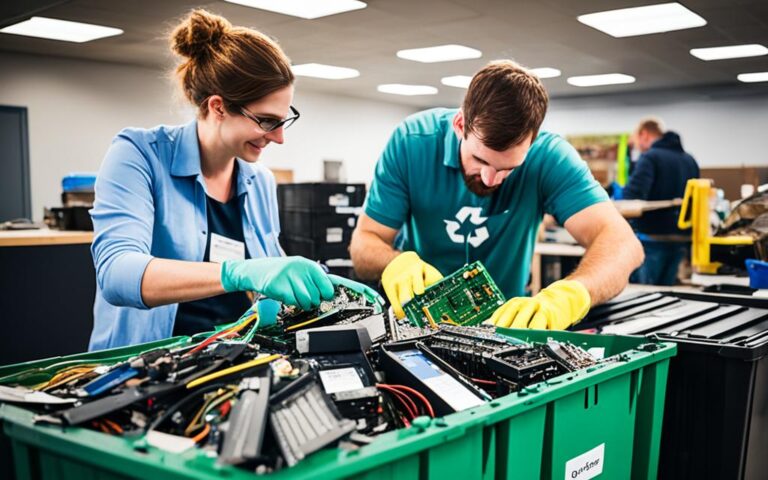Desktop Recycling: A Pillar of Environmental Responsibility
Desktop recycling is an important practice that promotes environmental responsibility. With over 2 billion PCs being used worldwide, the energy consumption and environmental impact of these devices are immense. Green computing, also known as eco-friendly computing, is the concept of designing, using, and disposing of electronic waste in a way that minimises harm to the environment.
This includes minimising energy consumption, utilising green energy, and minimising equipment disposal requirements through recycling and refurbishing. Green computing started with the introduction of the Energy Star Programme in 1992, and e-waste recycling plays a crucial role in promoting green computing by reducing greenhouse gas emissions and conserving natural resources.
Veracity World is a reputable green company that focuses on environmentally friendly e-waste management, providing recycling, repair, and refurbishing solutions for used electronics.
The Growing Importance of Sustainable Practices in the Tech Industry
The tech industry is increasingly recognizing the importance of sustainable practices in response to the environmental impact of producing new technologies. With the growing concern for climate change and resource depletion, sustainable practices have become a top priority for companies in the tech industry. By adopting eco-friendly strategies, tech companies can reduce their carbon footprint and contribute to a more sustainable future.
One key area where sustainable practices are gaining momentum is the use of recycled materials in devices and displays. By incorporating recycled materials, such as plastics, metals, and glass, tech companies can significantly reduce emissions and waste associated with the production process. This not only helps to conserve natural resources but also minimizes the ecological impact of electronic waste.
Leading the charge towards sustainability is the Consumer Technology Circularity Initiative, a collaborative effort by major tech companies including Lenovo, LG, Panasonic, Samsung, and Sony. This initiative aims to reduce the climate impact of consumer electronics by prioritizing the recycling of materials and minimizing the disposal of electronic waste. By aligning their efforts, these companies are paving the way for a more sustainable tech industry.
In addition to recycling initiatives, tech companies are also focusing on extending the lifespan of their products. Brands like Google, Apple, and Samsung are actively promoting repairability and offering repair options for their devices. By encouraging consumers to repair and reuse their products, these companies are reducing electronic waste and conserving valuable resources.
The adoption of sustainable practices in the tech industry is not only driven by environmental considerations but also by consumer demand. Today’s consumers are increasingly conscious of their environmental impact and are actively seeking greener products and brands. By integrating sustainable practices into their operations, tech companies can differentiate themselves in the market and attract environmentally conscious consumers.
“It’s exciting to see the tech industry embracing sustainability and taking proactive steps to reduce its environmental impact. By prioritizing the use of recycled materials, extending product lifespans, and embracing repairability, tech companies are playing a crucial role in creating a more sustainable future.” – Jane Foster, Environmental Advocate
The Benefits of Sustainable Practices in the Tech Industry
- Reduction in greenhouse gas emissions: By using recycled materials and promoting repairability, the tech industry can significantly reduce its carbon footprint.
- Conservation of natural resources: Sustainable practices help to conserve valuable resources like metals, plastics, and rare earth minerals.
- Cost savings: Adopting sustainable practices can lead to cost savings through reduced material usage and increased energy efficiency.
- Positive brand image: Companies that prioritize sustainability often gain a competitive edge and enhance their brand reputation.
With the growing importance of sustainable practices in the tech industry, it is clear that environmental responsibility is becoming a key driver of innovation and competitiveness. By embracing sustainability, tech companies can not only reduce their environmental impact but also create a positive impact on society. As the demand for greener products continues to rise, it is crucial for companies in the tech industry to prioritize sustainable practices and contribute to a more sustainable future.
Microsoft’s Commitment to Environmental Sustainability
Microsoft is a leading global technology company with a strong commitment to environmental sustainability. Recognizing the urgent need to address climate change and protect the planet, Microsoft has set ambitious goals to drive positive environmental impact.
By 2030, Microsoft aims to achieve carbon negativity, meaning they will remove more carbon dioxide from the atmosphere than they emit. Additionally, Microsoft is committed to removing all the historical carbon emissions the company has produced since its founding in 1975 by 2050.
In addition to their carbon reduction goals, Microsoft is also striving to be water positive and zero waste by 2030. Being water positive means that Microsoft will replenish more water than the company consumes in its operations, helping to conserve this precious resource. Zero waste means that Microsoft aims to eliminate waste sent to landfills, incineration, or water bodies.
Furthermore, Microsoft is focused on protecting more land than they use by 2025. This commitment extends beyond their corporate campuses to include the preservation of natural habitats and ecosystems.
Microsoft’s dedication to environmental sustainability goes beyond setting goals. The company actively invests in carbon removal and recycling efforts, diverting waste from landfills and incinerators. They have also made significant strides in providing clean water and sanitation solutions to communities in need.
“At Microsoft, our commitment to environmental sustainability is embedded in our culture,” said Satya Nadella, CEO of Microsoft. “We understand that addressing the challenges of climate change requires collaborative action, and we are working with partners across industries to drive meaningful impact.”
Microsoft is constantly exploring innovative solutions in climate science and technology to accelerate progress towards their sustainability goals. They also prioritize ethical standards in their supply chain, collaborating with suppliers to ensure responsible and sustainable practices throughout the production process.
Even in their products and services, Microsoft integrates environmental sustainability. For example, Xbox consoles offer carbon-aware game downloads and updates, reducing the carbon footprint of gaming activities.
Microsoft’s commitment to environmental sustainability serves as a prime example of a tech company taking significant steps to minimize its environmental impact and drive positive change. By prioritizing sustainability, Microsoft is not only setting an industry standard but also inspiring others to follow suit.
The Role of Sustainable Materials in Tech Products
More tech companies are recognizing the importance of incorporating sustainable materials into their products to reduce emissions and waste. Brands like Dell, Razer, and Samsung have made commitments to using recycled plastics and metals in their devices, taking significant steps towards a greener future for the tech industry.
Dell, a pioneer in sustainable design, has been incorporating recycled materials into their products since 2007. Their efforts have led to innovative solutions such as modular parts and reduced material waste, contributing to a more circular economy.
Similarly, Panasonic is developing systems that blend recycled plastics with antioxidants and other materials to create new, sustainable plastics for their products. This ensures that valuable resources are reused effectively while minimizing environmental impact.
It’s not just hardware manufacturers that are prioritizing sustainable practices. Semiconductor maker AMD focuses on energy efficiency in their server CPUs, aiming to reduce energy consumption in large-scale computing. This commitment to sustainability extends beyond the final product, addressing the energy consumption associated with its usage.
The use of sustainable materials in tech products is a win-win situation. Not only does it help reduce the environmental impact, but it also fulfills the growing consumer demand for greener options. Consumers are increasingly conscious of the environmental footprint of the products they purchase and are actively seeking brands that align with their sustainability values.
Benefits of Sustainable Materials in Tech Products
- Reduces emissions and waste
- Conserves natural resources
- Supports the circular economy
- Meets consumer demand for eco-friendly options
“Using sustainable materials in tech products contributes to a more environmentally responsible industry, addressing pressing concerns of emissions, waste, and resource conservation.”
Tech Companies and Their Use of Sustainable Materials
| Company | Recycled Materials Used |
|---|---|
| Dell | Recycled plastics, metals |
| Razer | Recycled plastics |
| Samsung | Recycled plastics, metals |
| Panasonic | Recycled plastics blended with antioxidants and other materials |
| AMD | Energy-efficient server CPUs |
As sustainability becomes a key differentiating factor in the tech industry, more companies are taking steps towards incorporating sustainable materials in their products. By choosing greener options, consumers can contribute to a more sustainable future and support brands that prioritize environmental responsibility.
Conclusion
Environmental desktop recycling plays a crucial role in promoting sustainability in the tech industry and reducing the environmental impact of electronic waste. As tech companies strive to implement environmentally responsible practices, green computing practices such as minimizing energy consumption, utilizing green energy, and recycling equipment have become key pillars of their operations. Leaders like Veracity World, Microsoft, and Dell are setting examples by incorporating sustainable practices throughout their processes, from e-waste management to using recycled materials in their products.
With the ever-growing importance of sustainability in the tech industry, it is imperative for both companies and consumers to prioritize eco-friendly practices. By embracing green computing and supporting initiatives for environmental responsibility, we can contribute to a more sustainable and environmentally conscious future. It is encouraging to see tech giants leading the way in this effort, but it is essential for all players in the industry to follow suit.
From reducing energy consumption to recycling equipment, adopting environmentally friendly practices has a far-reaching impact. As consumers, we have the power to drive change by demanding greener options and making conscious choices. By choosing products from companies committed to sustainable practices, we can collectively make a significant difference in reducing electronic waste and promoting environmental responsibility. Let us all play our part in creating a more environmentally responsible future for the tech industry and beyond.
FAQ
What is desktop recycling and why is it important?
Desktop recycling is the practice of disposing of electronic waste in an environmentally responsible way. It promotes sustainability by minimizing the environmental impact of discarded computers and reducing greenhouse gas emissions. It also conserves natural resources by recycling and refurbishing electronic equipment.
How does green computing contribute to environmental responsibility?
Green computing, also known as eco-friendly computing, involves designing, using, and disposing of electronic waste in a manner that minimizes harm to the environment. It includes minimizing energy consumption, utilizing green energy sources, and reducing equipment disposal requirements through recycling and refurbishing. By adopting these practices, companies can reduce their carbon footprint and conserve natural resources.
What is the Energy Star Program and its connection to green computing?
The Energy Star Program, introduced in 1992, is a voluntary program that certifies energy-efficient consumer products. It played a crucial role in promoting green computing by encouraging the development and use of energy-efficient electronics. By choosing Energy Star certified devices, consumers can contribute to environmental sustainability by reducing energy consumption and supporting green computing practices.
How do tech companies implement sustainable practices?
Tech companies are increasingly recognizing the importance of sustainable practices to reduce the environmental impact of their products. They are incorporating recycled materials into their devices, extending product lifespans, and offering repair options to reduce electronic waste. These efforts align with consumer demand for greener products and help differentiate brands based on sustainability efforts.
What are Microsoft’s sustainability goals?
Microsoft has set ambitious goals to achieve carbon negativity by 2030 and remove historical emissions since its founding by 2050. They aim to be water positive and zero waste by 2030 and protect more land than they use by 2025. Microsoft invests in carbon removal and recycling efforts, collaborates with suppliers to ensure ethical standards, and integrates sustainability into their products and services, such as carbon-aware game downloads for Xbox consoles.
How do tech companies incorporate sustainable materials into their products?
Tech companies like Dell, Razer, and Samsung are using recycled plastics and metals in their devices. Dell, for example, has been using recycled materials since 2007 and focuses on sustainable design, including modular parts and reduced material waste. Other companies, like Panasonic, are developing systems to blend recycled plastics with other materials to create new plastics for their products. The use of sustainable materials in tech products reduces environmental impact and meets the demand for greener options.








